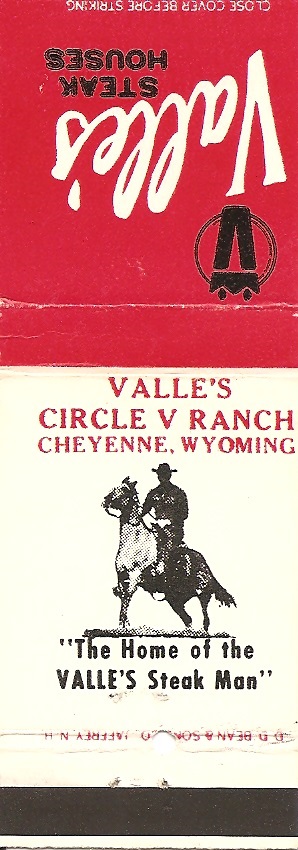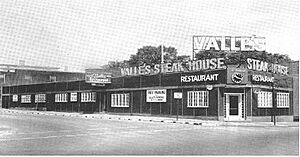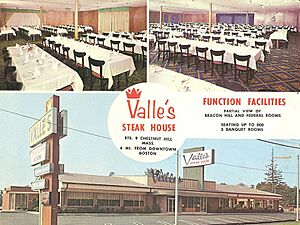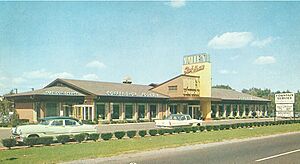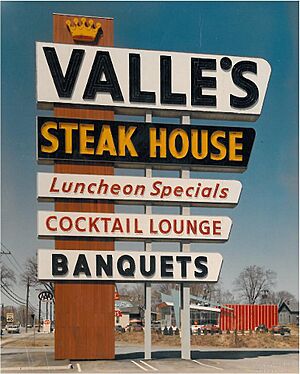Valle's Steak House facts for kids
Quick facts for kids 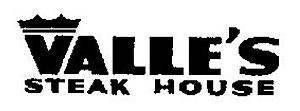 |
|
| Private until 1968 public offering; subsequently went private in a 1982 leveraged buy out | |
| Industry | Dining |
| Fate | Sold off assets to private investors |
| Founded | 1933 |
| Defunct | 2000 |
| Headquarters | Newton, Massachusetts |
|
Key people
|
Donald Valle, Richard Valle, Judith Valle, and Arthur W. Hanson |
| Products | Valle's Steak House specialized in prime steaks and lobsters |
| Revenue | $69.5 million in 1981 (peak earnings) |
|
Number of employees
|
3,600 |
Valle's Steak House was a popular chain of restaurants in the East Coast of the United States. It served delicious steaks and lobsters from 1933 until the year 2000. This family-run business grew quickly in the early 1970s. However, it faced tough times due to the gas crisis and a difficult economy. Rising costs, the death of its founder, and changing customer tastes also played a part. The very last Valle's Steak House closed its doors in August 2000.
Contents
Who Ran Valle's Steak House?
Valle's Steak House was a family business. Here are some of the key people who helped run it:
- Donald Valle was the founder of Valle's Steak House. He was born in Italy in 1908 and moved to the United States when he was four. In 1933, he opened his first restaurant in Portland, Maine. Donald was known for working very long hours, sometimes 14 to 18 hours a day! He was married to Sue Crone and had two children, Richard and Judith. Donald passed away in 1977.
- Richard Valle was Donald and Sue Valle's son. He was a veteran of the Korean War. Richard became very involved in the company in the 1950s. After his father died, Richard became the President and CEO. In 1980, he became the company chairman. He sold his shares in the company in 1982. Richard Valle died in 1995 when he was 64.
- Judith Valle was Donald and Sue Valle's daughter. She worked as the company's vice-president. In 1982, she and other family members sold their shares to a private group. Judith then used that money to buy the original Valle's Steak House in Portland. She ran that restaurant from 1984 until it closed in 2000.
- Arthur W. Hanson took over the company in 1982. He started working for Valle's in 1959 as a manager in Kittery, Maine. Donald Valle quickly saw his talent and made him a vice president. By 1963, he was in charge of operations, including planning and training. Hanson managed the company until it closed in 1991. He later worked in real estate and passed away in 2015.
How Valle's Steak House Operated
Valle's Steak House was known for serving a lot of customers. They focused on prime steaks, fresh seafood, and Maine lobsters. Each restaurant was huge, able to seat between 800 and 1400 people. They had many waiters and waitresses who were trained to be fast. This meant customers could enjoy their dinner in less than an hour. By the mid-1960s, the restaurants in the Boston area alone served over 12,000 lobsters every Friday night!
Donald Valle was very smart about getting his ingredients. He bought beef directly from Swift and Company in Chicago. This beef was even shipped by train to his restaurants in Maine. Much of the company's beef came from Valle's own ranch in Wyoming, called the "Circle V."
Valle also invested in making his restaurants very efficient. For example, in 1965, Richard Valle showed off a $50,000 automatic dishwashing machine. This was at their new $1.5 million restaurant in Braintree, Massachusetts. This location could serve 5,000 customers a day!
Donald Valle was a very hard worker. He expected his employees to work hard too. He once joked that his workers were trim because they were always so busy.
Valle's main focus was on food, not drinks. Over 85% of their money came from food sales. Richard Valle once said, "We haven't been in the business since 1933 from selling liquor but good food and good service."
Growing Big: Early History and Expansion
Valle's Steak House started as a small 12-seat cafe in Portland, Maine, in 1933. Donald Valle bought it right after Prohibition ended. The cafe did well, so Valle bought a bigger restaurant in Portland. He also bought a nightclub in Scarborough, Maine, and turned it into a restaurant.
Next, Valle built his first custom-designed steak house in Kittery, Maine. In the mid-1960s, he expanded into Massachusetts. He opened three busy restaurants in Saugus, Newton, and Braintree.
In 1968, the company became public, meaning people could buy shares in it. By 1969, Valle's was serving over 200,000 customers each week. They had 1,300 employees and even their own credit cards.
By 1970, the company had grown into Rhode Island, Connecticut, and New York. They were making record profits. The Campbell Soup Company even tried to buy Valle's. At that time, Valle's had 12 restaurants and was planning five more. Campbell offered a lot of money, but the deal fell through. Donald Valle said Campbell wanted too much control.
In 1972, Valle's started building new restaurants in the Washington, D.C. area and Atlanta. They also planned locations in Yonkers, Philadelphia, Fort Lauderdale, and Daytona Beach.
One Valle's location in Saugus, Mass was near the famous Hilltop Steak House. The Hilltop was one of the highest-earning restaurants in the U.S. and often had long waits. Some people joked that the Saugus Valle's was "the place to go when you couldn't get into the Hilltop."
The Braintree, Mass Valle's was one of the busiest. On Thanksgiving Day 1979, it prepared 1,200 pounds of turkey for 2,000 customers. This was only their fifth busiest day, after Mother’s Day, Christmas, Easter, and New Year’s Day.
Revenues continued to grow into the mid-1970s, but more slowly. Rising inflation, unemployment, and gas prices worried Richard Valle. He warned investors that profits might not keep growing as fast. By 1977, both sales and profits started to drop.
Why Valle's Steak House Closed
Several things led to the closing of the Valle's Steak House chain.
Financial Challenges and Changes
When Donald Valle died in 1977, his family faced a large inheritance tax bill. This was a tax on the money and property left behind. The family struggled to pay it. This, combined with falling sales and rising costs, made things very difficult.
In 1981, Richard and Judith Valle tried to sell their shares in the company. At this time, the company had 32 restaurants. Even though they made $65.9 million in sales, they lost money that year. Richard Valle stepped down as president, and Arthur W. Hanson took over. Valle's also started closing some restaurants for the first time. For example, the Rochester, New York, store, which opened in 1971, never made a profit and was closed.
After the family sold their shares, the chain continued to sell off properties. Between 1982 and 1984, all their Florida locations were sold. Other large restaurants in places like Fall River, Atlanta, and Miami also closed.
In 1983, Judith Valle bought the Portland Valle's Steak House from the company. She ran it as her own independent restaurant. Arthur Hanson also created a new parent company called Polar Bear Restaurant Corporation for the remaining Valle's locations.
The last three Valle's Steak House restaurants under Hanson's company closed on December 27, 1991. These were in Kittery, Maine; Andover, Massachusetts; and Hartford, Connecticut.
Judith Valle's restaurant in Portland continued to operate as "Valle's Steak House" until it finally closed on August 20, 2000.
Key Reasons for Decline
- Inheritance Taxes: The Valle family could not pay the large taxes on Donald Valle's estate. Judith Valle said in 2000, "No matter how much business we did, we couldn't pay the government." Susan Collins, a U.S. Senator, later used Valle's Steak House as an example to argue for changes in tax laws for family businesses.
- Economic Problems: The gas crisis, high inflation, and rising labor costs hit the chain hard from the mid-1970s through the 1980s. Many other restaurants also struggled. Richard Valle noted that people were eating out less often. He also explained that rising minimum wage meant they had to pay all their staff more, from cooks to cashiers. This forced Valle's to raise prices, which made fewer customers come.
- Outdated Business Style: Valle's focused heavily on food sales, even though selling alcohol often brought in more profit. They also insisted on full table service and did not use self-service salad bars, which many other restaurants used to save money on staff.
As energy costs went up, it became expensive to heat, light, and maintain their huge restaurants. These places had banquet rooms that could seat up to 1,000 people. Richard Valle noticed that big events like weddings were getting smaller. He designed a smaller restaurant that would be cheaper to run, but by then, the company's sales were too low to build them.
Some people also thought the restaurants looked too much like cafeterias. Critics also questioned why they used a New England-style menu in southern cities like Atlanta. Customers there were not familiar with dishes like clam chowder or baked stuffed lobsters. A former manager said, "Atlanta wasn't as cosmopolitan as it is today. It was still very Southern. The idea of a Northeastern steak house didn't really excite people there."
What Happened After?
Valle's Steak House was a well-known restaurant for many years. People still talk about it in articles and on websites. You can even find old items from the chain, like matchbooks, sold online.
Many of the former Valle's restaurants have been torn down or changed. The Andover location, which was one of the last to close, is now an Italian restaurant. The Braintree restaurant, once the largest, became a Hilltop Steak House for a while. It was torn down in 2006 to make way for a car dealership. Ronald Reagan even gave a campaign speech there in 1980 when he was running for president. The Kittery location still stands but is no longer a restaurant.
Images for kids
 | Georgia Louise Harris Brown |
 | Julian Abele |
 | Norma Merrick Sklarek |
 | William Sidney Pittman |


